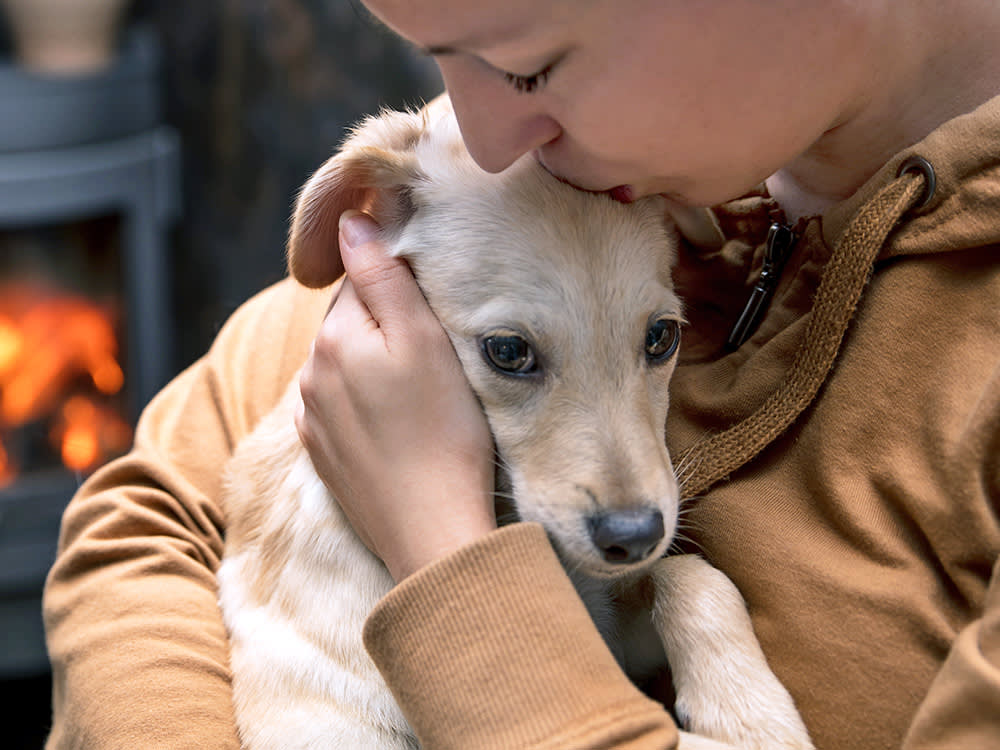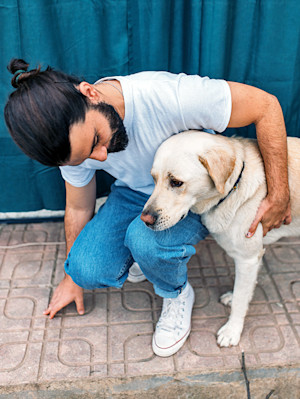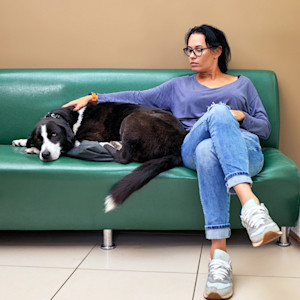Puppy Diarrhea: Possible Causes and What to Do About It
Diarrhea in puppies can be caused by many things.

Share Article
In This Article:
How Do You Know If Your Puppy Has Diarrheaopens in a new tab 8 Most Common Reasons for Puppy Diarrheaopens in a new tab Dangers of Diarrhea in Puppiesopens in a new tab When to Talk to Your Vet About Your Puppy Diarrhea opens in a new tab Treatment for Puppy Diarrheaopens in a new tab How to Prevent Diarrhea in Puppiesopens in a new tab Signs You Need to Seek Emergency Help for Puppy Diarrheaopens in a new tab Final Thoughts: Why Your Puppy Has Diarrheaopens in a new tab Frequently Asked Questionsopens in a new tab
So, you have a cute, new, bouncing baby puppy. It’s so exciting, and things are going well — until your puppy has diarrhea. It can be very surprising if there are no other symptoms or blood in the stool. You wonder what could be causing it and if you should do something. We have the answers to share with you. After all, just like you, we want nothing but healthy, happy puppies.
Main takeaways
Puppy diarrhea is an increased frequency and decreased firmness of stools.
If there are other symptoms, you may need a visit to the vet.
There are numerous reasons why puppies may have diarrhea.
There are dangers associated with diarrhea in puppies.
Almost every case of diarrhea can be treated.

littleKin™ is Kinship’s home just for puppy and kitten parents. Bop over to check out expert advice, new pet tools, and special deals—all curated for your newest family member.
opens in a new tabHow do you know if your puppy has diarrhea?
That question may sound strange, but pet parents often get the answer wrong, especially if they are first-time pet parents. Puppy diarrheaopens in a new tab usually refers to loose or even watery stools. But there’s a second factor. True diarrhea also refers to the frequency of your puppy’s bowel movements; it also means your puppy is pooping too often. It requires both factors, loose and more frequent, to really be diarrhea.
The other big point you should be aware of is how urgent it is to monitor your dog’s diarrhea closely, paying close attention to consistency, frequency, color, and blood in the stool and whether there are any other symptoms.
Other symptoms associated with puppy diarrhea
What other symptoms are we referring to? Here are some examples:
Vomiting
Loss of appetite
Lethargy
Dehydration
Fever
Belly pain
Anything out of the ordinary should be cause for concern and may require a visit to your vet.
Signs you need to seek emergency help for puppy diarrhea
Seek emergency veterinary care if your puppy shows the following signs:
Diarrhea lasting more than 24 hours
Blood in the stool unless it’s just one small streak
Extreme lethargy or unresponsiveness
Frequent vomiting
Signs of severe dehydration (e.g., sunken eyes, dry gums, skin that doesn’t spring back when you pinch it)
The above are severe signs that require immediate emergency help.
8 most common reasons why your puppy has diarrhea
There are many reasons why a puppy can have diarrhea. Here are eight of the most common causes:
Changes in diet
If you feed your puppy something different from what they’re used to eating, they can develop an upset stomach with diarrhea. When you change foods for any reason, it should be done gradually.
Food allergies or intolerance
What’s the difference? A food allergy involves the immune system. Common allergens are chicken and grains. The result is often chronic inflammation in the skin and digestive system. Food intolerance does not involve the immune system; it’s a temporary reaction, usually in the digestive system, to a food, such as lactose.
Viral infection
Viruses like parvovirus or distemper are serious causes of diarrhea in puppies. Young pups have immature immune systems and may not have received all their vaccines, which can lead to very severe cases of diarrhea, vomiting, and other symptoms that can be deadly. These conditions often require immediate veterinary intervention.
Bacterial infection
Bacteria such as salmonella or E. coli can cause severe gastrointestinal distress, leading to diarrhea, vomiting, and other symptoms. Puppies can quickly become dehydrated and need vet attention.
Parasitic infection
This occurs when your pooch has parasitesopens in a new tab in their intestines, such as roundworms, hookworms, whipworms, coccidia, or giardiaopens in a new tab. If not treated, chronic diarrhea can develop, requiring treatment by your vet.
New environment
A sudden change in environment, such as moving to a new home, meeting a new person, or hearing loud noises, can stress your puppy and disrupt their digestive system.
Change in routine
Dogs like consistency. They do best when their daily walk is around the same time, their feeding schedule is the same each day, and the important humans in their lives are around at the same time.
Eating something they shouldn’t have
Being the curious scavengers they are, puppies often get themselves in trouble. They eat from the garbage can, eat from the litter box, eat their own feces, get into plants and flowers, get chocolates off the counter, and more. Unfortunately, there are many dangers in doing so. Toxic flowers and plants, chocolate, garlic and onions, chicken bones, which can obstruct their GI tract, and grapes and raisins are just a few of the dangers they face that can cause diarrhea and even more serious problems.
Dangers of diarrhea in puppies
Some cases of diarrhea in young dogs are mild and resolve in a very short while. However, others can be quite serious and need vet care, sometimes immediately.
One of the most common dangers of diarrhea in puppies is dehydration. It can happen quickly and can worsen your puppy’s condition.
Diarrhea can also cause nutrient deficiencies.
Chronic diarrhea can also weaken a pup’s immune system, making it more susceptible to infections.
Chronic diarrhea can cause damage to the intestinal lining.
Diarrhea can be a sign of more serious illnesses.
Blood in diarrhea is a warning sign of severe irritation, infection, or internal injury, necessitating urgent veterinary care.
It’s important to remember these dangers and the symptoms listed above so you know when you can treat them at home and when a vet visit is required.
What it means when your puppy has diarrhea with blood in it
Blood in your puppy’s stool is a red flag that could indicate severe infections, intestinal damage, or ingesting toxic substances. Immediate veterinary care is critical. If you notice a small streak of blood once or twice, it may not be of such importance.
When to talk to your vet about your puppy’s diarrhea
Any time your puppy has diarrhea, it’s perfectly normal if you want to pick up the phone and call your vet. It’s better to be safe than sorry. However, many cases of diarrhea in puppies are mild and can be treated at home. See your vet if your pup’s diarrhea lasts more than 24 hours, has blood in it, or is accompanied by other symptoms, such as vomiting, lethargy, fever, or signs of dehydration.
How vets diagnose diarrhea in puppies
The first thing your vet will do is a complete history. There can be many clues in the history that will help the veterinarian diagnose the underlying cause. Next, a complete physical exam will be performed, including an evaluation of hydration and palpation of the abdomen. If you didn’t bring a fecal sample, your vet will try to obtain one as the rectal exam is being done. Blood tests and imaging may be recommended, including X-rays and an MRI or CT scan.
Treatment for puppy diarrhea
Treatment for a mild caseopens in a new tab may include a short fasting period followed by a bland diet and possibly a probioticopens in a new tab. Always ask your vet about any medicationsopens in a new tab you want to give your pup before giving anything. The bland diet can be boiled chicken and boiled white rice. Feed small amounts frequently and always provide fresh water. If your dog won’t eat or can’t keep the food down, then call your vet. If all goes well and the diarrhea stops, then continue feeding the bland diet for a couple of days. After that, slowly reintroduce your pup’s regular food.
If your puppy’s diarrhea is more severeopens in a new tab or your vet finds an underlying cause that has to be addressed, other medications, diets, fluids, and possibly dewormers may be prescribed. Some cases of diarrhea even require a stay in the hospital.
Does diarrhea in puppies go away on its own?
Yes, mild cases of diarrhea may resolve without treatment, especially if caused by minor dietary changes. However, persistent or severe cases require veterinary intervention.
How to prevent diarrhea in puppies
Not all cases of diarrhea can be prevented, but with a little effort, you can help your puppy avoid many instances of diarrhea. To prevent diarrhea:
Ensure your puppy is on a consistent diet.
Avoid feeding your puppy table scraps.
Keep your puppy’s environment clean.
Monitor your puppy closely to prevent them from eating harmful objects.
Schedule regular vet visits and stay up-to-date on vaccines and dewormings.
With just that bit of effort, you can keep your dog safe from many diarrhea-related dangers.
Signs you need to seek emergency help for puppy diarrhea
There are certain symptoms that just can’t wait for a veterinary examination. They include:
Persistent or severe diarrhea
Bright red blood or dark, tar-like stool can indicate internal bleeding or severe infection.
Severe dehydration, signs of which include dry gums, sunken eyes, loss of skin elasticity, and lethargy
Frequent vomiting paired with diarrhea can quickly lead to severe dehydration and nutrient loss.
Extreme lethargy or weakness
If your puppy appears unusually tired, unresponsive, or unable to stand, seek immediate help.
Fever: A rectal temperature above 103°F (39.4°C) may indicate infection or illness requiring urgent care.
Signs of abdominal pain: Crying, restlessness, or a swollen abdomen can be signs of severe digestive issues or intestinal blockages.
Suspected toxic ingestion: If your puppy may have eaten something toxic (e.g., chocolate, plants, chemicals), diarrhea can be a symptom of poisoning, which needs urgent treatment.
If your pup has any of these symptoms, talk to your vet right away. If your vet isn’t available, go to the closest emergency vet.
Final thoughts: why your puppy has diarrhea
As you can see, puppy diarrhea has many potential causes. Some are mild and able to be treated at home. Others can be quite serious and need you to involve your veterinarian. Becoming familiar with severe symptoms is necessary for a puppy parent, so you know when to call the vet or rush to the emergency room.
Most cases of dog diarrhea are quite treatable if they are caught early. Along with being treatable, many cases are preventable. Feed a high-quality diet, avoid table scraps, keep the environment safe, monitor them to prevent them from eating harmful objects, and stay up-to-date on vet visits, vaccines, and deworming. You can do a lot to keep your puppy from coming down with diarrhea and keep your dog safe, happy, and healthy.
FAQs
Why does my puppy have diarrhea but act normal?
A puppy with diarrhea but normal behavior may have a mild dietary issue or stress. Fast for a few hours, then feed a bland diet of boiled chicken and boiled white rice. Offer fresh water. Monitor closely and consult your vet if symptoms persist.
What to feed a puppy with diarrhea?
Offer bland foods like boiled chicken and rice. Avoid fatty or spicy foods, and consult your vet for long-term dietary adjustments. There are special diets just for sensitive stomachs if your pup ends up needing one.
Can a puppy have diarrhea after worming?
Yes, deworming medications can cause temporary diarrhea as the parasites are expelled. This should be resolved within a day or two.Your vet may want to do a second deworming in 10 to 14 days, which may cause temporary diarrhea again.
Can puppies get diarrhea after vaccination?
Some puppies experience mild diarrhea following vaccination due to stress or mild immune responses. This usually resolves quickly.
Can teething give puppies diarrhea?
Teething may cause stress or increased chewing on objects, leading to mild digestive upset and diarrhea.
References
Grellet, Aurélien, et al. “Risk Factors of Weaning Diarrhea in Puppies Housed in Breeding Kennels.” Preventive Veterinary Medicine, vol. 117, no. 1, Nov. 2014, pp. 260–265, https://doi.org/10.1016/j.prevetmed.2014.07.016opens in a new tab.
Westermarck, Elias. “Chronic Diarrhea in Dogs: What Do We Actually Know about It?” Topics in Companion Animal Medicine, vol. 31, no. 2, June 2016, pp. 78–84, https://doi.org/10.1053/j.tcam.2016.03.001opens in a new tab.

Dr. Shelby Neely, DVM
Dr. Shelby Neely is a freelance writer and veterinarian who graduated from The University of Pennsylvania and has practiced veterinary medicine for 30 years. She has found homes for hundreds of stray pets and has two cats as well as four grand-dogs and two grand-cats. In her spare time, Dr. Neely likes to be with her three children, their dogs and cats, and her own two cats. She also likes to see as many Broadway shows as possible.
Related articles
![feeding black dog rice water to help relieve diarrhea]() opens in a new tab
opens in a new tabVet-Approved Diarrhea Treatments
Shudder. It happens to all of us.
- opens in a new tab
What Can I Give My Dog for Diarrhea?
It’s not fun for anyone.
![Man comforting his Labrador dog outside.]() opens in a new tab
opens in a new tabMy Dog Has Diarrhea but Is Acting Fine: What to Know
Understand their problem, and make an informed health decision.
- opens in a new tab
What Should You Feed a Dog With Diarrhea?
Keep it plain. Here’s why.
- opens in a new tab
What Causes Diarrhea in Dogs?
It’s a poopy problem to have.
![Woman comforting large black and white dog on the couch.]() opens in a new tab
opens in a new tabMy Dog Has Bloody Diarrhea: What to Do and Home Remedies
And when to visit your veterinarian.





